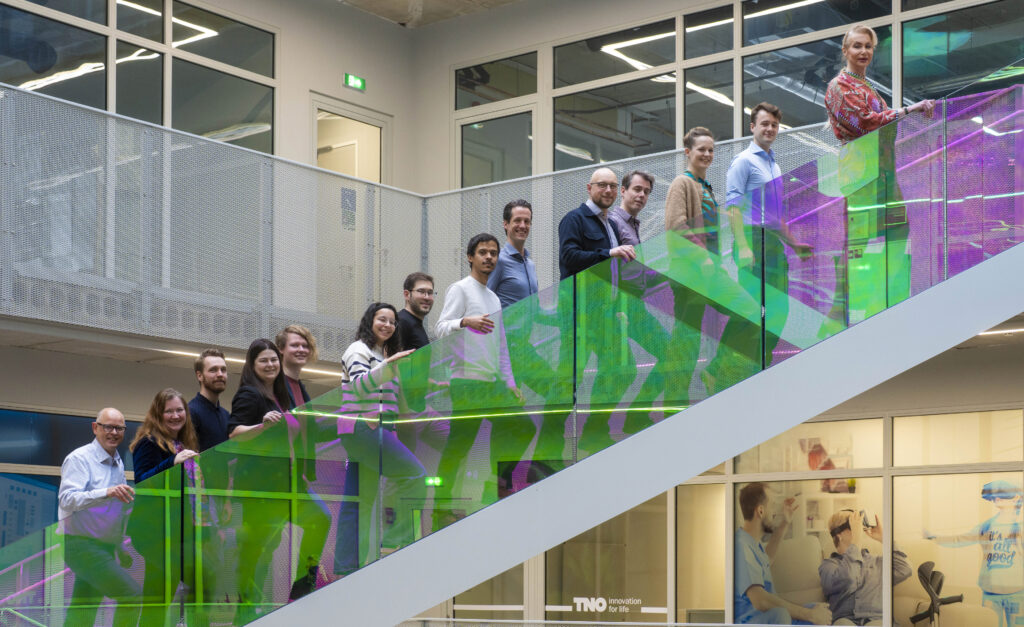The Advanced Computing Engineering group at TNO develops adaptive IT systems, cloud-edge federations, and software innovations to enhance flexibility in complex digital environments.
‘Our mission is to bridge the gap between fundamental and industrial research’, says Andreea Balau, research manager of the TNO research group Advanced Computing Engineering (ACE). ‘We combine digital and societal innovations and bring movement where transitions become stuck.’
The ACE group consists of about thirty senior to junior researchers, some of whom, like Balau, work in The Hague and others in Groningen. The group has three core research lines: Adaptive IT systems, Cloud-Edge Federations, and Innovations in Software Engineering.
An ACE project where all three research lines intersect comes from the military domain. Modern military vehicles act as mobile miniature data centres. Military crew should be able to rely on the data that the vehicles collect and exchange. ‘Such a collection of high-tech military vehicles is an example of a distributed IT system that must be able to constantly adapt to new circumstances’, says Balau. ‘Traditionally, adding a new sensor, like a camera, to a military vehicle was cumbersome work. Our group worked on a plug-and-play architecture for vehicle additions, making it easy to quickly change the configuration. In this way, the IT system can react swiftly to changing mission requirements that might arise. It allows the military crew to have access to the right information at the right time and at the right level.’
An example of the group’s Cloud-Edge Federation research is the project ECOFED, in which TNO works closely with the Dutch and EU cloud industry to enable an open cloud ecosystem. Its open architecture eliminates vendor lock-ins to increase market dynamics between providers and consumers. ‘This way, we contribute to the EU’s Digital Sovereignty goals and lower dependency on a few big tech companies’, Balau explains. ‘It allows you to use different providers, switch easily and compose multiple cloud environments from a diverse technological landscape.’ In 2024, ECOFED won a Computable Award.
Balau explains that the group’s third research line, Innovations in Software Engineering, supports the other two research lines. ‘Here we look at hybrid computing architectures, in which, for example CPUs, GPUs, edge devices and even neuromorphic computing are combined. We are also looking at how we can integrate new developments such as Generative AI systems into this.’
Smarter systems
Elena Lazovik has been working in TNO’s ACE group for thirteen years. She has a background in both law and computer science, having started as a lawyer, but switching to computer science. ‘I knew TNO from invited lectures at university’, she states. ‘As a senior scientist, I now give these kinds of invited lectures myself.’ Lazovik has been doing research towards autonomous computing and digital twins for offshore windmills and smart electricity grids, for example. ‘We try to make such systems smarter so that they can take their own decisions.’
She is also responsible for the scientific strategy of ACE. ‘What attracted me to my work’, she says, ‘is bringing experts from different domains together. As TNO, we tackle complex, multidisciplinary problems. Companies want their IT systems to become more adaptive but are often afraid to modify them due to their complexity. I enjoy developing easy-to-use solutions for them. We also have the Adaptive IT Laboratory in which we create demos for our partners.’
Although ACE is a group of thirty people spread geographically, there is a lot of exchange of ideas, Lazovik says. ‘We have a very open, collegial atmosphere. Of course, we collaborate a lot online, but three times a year, the whole group meets in person: once in Groningen, once in The Hague and once in a central location in the middle of the country.’
Work in practice
Niels Meima works within the research branch Adaptive IT. ‘I like to combine the latest knowledge from different fields and then demonstrate that a system can work in practice’, he says. In one of his projects, he investigates the most energy-efficient or cheapest route for an electric car, considering the start and end point, charging points along the possible ways and the influence of weather conditions.
Meima has been working in TNO’s ACE group for over four years now. ‘I came here through my master’s internship’, he says. ‘I stayed because, on the one hand, I have a lot of research freedom – it does feel a bit like a playground – and on the other hand, I can build things that can be applied. I’m usually involved in about five projects at a time.’
Meima thinks that in the coming years, TNO will focus more on supporting smaller companies, start-ups, and scale-ups. ‘This requires a somewhat different way of working than we are used to’, he explains. ‘We need to be more flexible and responsive, as these organisations often shift goals rapidly. But I do think that we are well placed to validate their ideas and help them grow. In this way, we can contribute to a stronger, more innovative Dutch economy.’
Group passport – Advanced Computing Engineering
Research fields
- Distributed systems, adaptive IT, cloud-edge federation, innovative software engineering, digital twinning
Institution
- TNO
Research facility
- Adaptive IT Laboratory
Employees: (as of February 2025)
- Around 30 highly skilled professionals with a scientific, consultancy or project management role
Websites
- Group website
- ECOFED
- Plug-and-play architectures for military vehicles
(Project ‘NATO Generic Vehicle Architecture (NGVA) Compliant Vehicle Infrastructure Demonstrator’)
Published in I/O Magazine #1 2025
Text Bennie Mols
Images Ivar Pel
